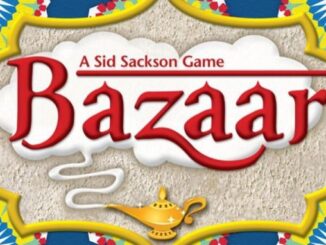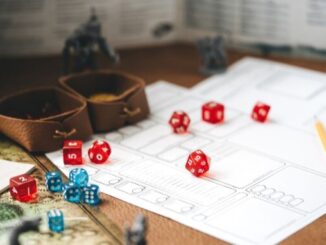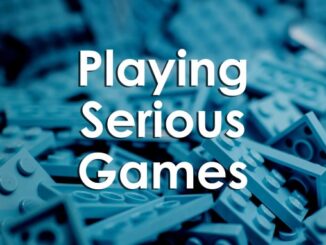
In theatre, an invisible fourth wall separates the audience from the onstage action. People in the audience are passive observers and not active participants. Breaking that wall invites the audience into the fictional world. It engages them.
There’s a fourth wall in L&D that we believe blocks engagement and stifles change.
If you want to improve performance, you must help staff to make changes. Training is at the heart of this support. But most training treats staff as passive targets for content and methodologies. They’re just expected to soak up the information from a screen. There’s no engagement, enjoyment, curiosity, or sense of responsibility and so nothing changes. There’s no practical outcome. It’s a dead-end.
You can break the fourth wall with board games that give learners direct control of their learning. Games that encourage a series of structured discussions between the players. Every individual has valuable knowledge and experience so don’t waste it, allow staff learn from each other.
Games can actively engage staff with the issues and with each other. They have fun exploring ideas, sharing experiences and finding new ways to work. Games will give them the knowledge, commitment and the confidence they need to make changes.
Educational games are being used in private companies, hospitals, schools and universities all over the world to improve education, training and development. But did you realise that many of them were invented at the frontline, by someone just like you?
Practitioners, educators and academics come to us with games they’ve developed at their kitchen table, or with ideas for games, and we then help them to create a professional product. We then sell those games and share the profit with the inventors (usually the individual’s employer).
Most of our partners have never developed a game before and they tell us that this co-creation is an interesting and enjoyable process. We’ve developed a simple process for working with partners that ensures developing the game doesn’t interfere with their day job. Our partners tell us it’s a real thrill when the first copy of their game is delivered. It’s even more satisfying when positive feedback begins to arrive from colleagues who are using their game.
Here are a few examples of the people we’ve worked with and the games that were developed from those partnerships:
 Betsi Cadwaladr University Health Board – Gareth Pierce Jones, Infection Prevention and Control Nurse.
Betsi Cadwaladr University Health Board – Gareth Pierce Jones, Infection Prevention and Control Nurse.
Gareth is passionate about using non-traditional teaching methods to help healthcare professionals to learn. Gareth created a board game to educate staff about C. difficile infections in a fun, alternative way.
“I played the game and I have to say it was brilliant fun and very educational. I recommend everybody takes on the challenge.” Gary Doherty, Chief Executive at Betsi Cadwaladr University Health Board.
King’s College London – Rhiannon Eley and Lucy Tyler
Rhiannon and Lucy are qualified nurses and adult nursing lecturers who have mentored and facilitated learning throughout their nursing careers and continue to support student learning in their role as Clinical Teachers. Rhiannon and Lucy wanted to develop a game that would help nurses and nursing students to practice and improve their prioritisation skills.
“We developed this board game as we have found that students often lack the confidence and opportunity to practice and reflect upon skills like prioritisation and decision making in a busy clinical environment but are expected to qualify with these skills. We hope that through learning about and developing these skills in a fun way, it is assisting nurses of the future to be safe and effective practitioners.” – Rhiannon and Lucy
Newcastle Upon Tyne Hospitals NHS Foundation Trust – Gill Hart, Clinical Nurse Educator.
Gill Hart teaches renal biology to nurses and students. To improve that training Gill developed a board game.
“As a trust we actively encourage our staff to come forward with innovative ideas on how to improve our service, and the Renal Game is a perfect example of this. It will certainly help our students and staff to engage in training, and hopefully it will become a vital addition to learning in other healthcare organisations throughout the UK.” Maurya Cushlow, Executive Chief Nurse at The Newcastle Upon Tyne Hospitals NHS Foundation Trust.

James Paget University Hospitals NHS Foundation Trust –Joan Pons Laplana
When Joan was Transformation Nurse at James Paget University Hospitals NHS Foundation Trust he suggested that we develop a simple myth busting digital game to persuade staff to get the seasonal flu vaccination. The game that we created with Joan has now been used by over 30 NHS trusts to help increase uptake of the seasonal flu vaccination among staff members.
“Strangely addictive. A great way to learn facts about flu.” Emergency Department Clinical Lead.
- Dementia: changing attitudes with a game. - 12th May 2021
- Co-creation with frontline staff - 15th February 2020





Andy, you hit all the right notes about the efficacy of games for frontline people who make change happen. And, in your business model, they co-create the games, too.
I am constantly reminded that, “Nobody ever washes a rental car,” and that active involvement in the design of ANYTHING is a key to generating commitment and followup. Frontline folks are generally talked AT and not often expected to be engaged in any meaningful way.
Games are a great way to break down those Fourth Walls and to change the whole aspect of what training is about.
On training, I am reminded of the “If they can do it, they do not have to be trained how to do it” mentality. So often, people in the workplace simply CHOOSE not to do something or they care little about the quality of their work because they have no ownership. Getting them to care often involves peer pressure as well as support from management, something that extrinsic reward systems simply cannot accomplish. But with play, we change those barriers and make the likelihood of change and commitment higher.
Good thoughts, Andy. Thanks for sharing. (And take a look at the Teaching the Caterpillar to Fly” thinking in my article. We are definitely on the same page with all this!)
I’m really interested in the process of co-creation. In fact, I’m in the middle of writing a book about an approach to learning design which pretty much requires a co-creative process. Very often, I have found that the ‘decision makers’ in the learning design process i.e. those who control the sign off on the resources and money, are very far removed from the learners, both in terms of their day-to-day experience and their status within the organisation.
Usually, the further removed they are, the greater decision-making clout they have – mostly due to the persistence of hierarchy. Consequently, it it all too easy to end up with a learning programme which reflects what the top brass think the staff should learn – based on little more than assumptions, rather than what the staff really need, based on lived experience. Co-creation, done well, is the first line of defence against this phenomenon.